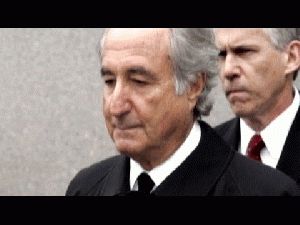Langone's comments were particularly incoherent. "If you go back to 1933, with different words," said Langone of populist rhetoric, "this is what Hitler was saying in Germany."
With "different words"? What does that even mean?
At least Madoff skipped the Hitler comparisons when he was interviewed recently for Politico. But in other ways he sounded strikingly like the others: opinionated, ill-informed, and yet accustomed to being listened to in a deferential way. That's what comes when you're tapped for campaign contributions by people who then feel obligated to ask your opinion.
"Madoff was constantly hounded by politicians," writes Politico interviewer ML Lee, "from local to federal candidates. He insisted that he found it all off-putting -- socializing at cocktail parties in the city, attending swanky fundraisers in the Hamptons, and feeling obligated to cut checks."
Federal Election Commission records show that most of the beneficiaries of Madoff's largesse were Democrats in the Wall Street "centrist" mold, including senators Chuck Schumer and Hillary Clinton. Madoff trashed some of the politicians he backed, which I've found is typical of his former class. Give some representatives or senators a few bucks, and pretty soon you're treating them like particularly slow-witted underlings. Langone, who describes himself as a devout Catholic, even felt free to lecture Pope Francis about the Holy Father's criticism of the ultra-wealthy.
Madoff addressed his complaints to President Obama, saying he was "terribly disappointed" because "(Obama's) policies are too socialist." The Obama administration rescued Wall Street, saved the stock market, and has yet to prosecute even a single big-bank executive. And yet these days the "socialist" refrain is common in billionaire circles.
That's gratitude for you.
Madoff also had choice words for New York City Mayor Bill de Blasio, saying "I'm not a great fan of redistribution of wealth." But what, exactly, is this Soviet-style "redistribution" of which Madoff speaks? De Blasio's proposed a tax increase of slightly more than half of one percent for income above $500,000 per year. The Independent Budget Office, a city agency, estimates that it would cost New Yorkers earning between half a million and a million dollars an average of $973 per year.
That's hardly like the Red Army coming to seize the family dacha.
Why have the hyper-wealthy become so hypersensitive? I agree with Will Bunch: There is a real element of "panic" fueling these incoherent and offensive comments. I also agree with Bunch's observation that the Nazi comparisons are "more than a tad silly, since "Hitler and the Nazis were about as pro-capitalism and pro-large corporations as they come."
Home Depot co-founder Ken Langone is a hardworking, smart businessman, and there's nothing in his background to suggest he's prone to either panic or silliness. And yet here he is, displaying considerable amounts of both. It's not as if Langone and his peers have persevered through tough times. As Bunch observes (his essay is well worth reading), CEO pay has risen from an average of 42 times as much as an average workers' income in 1980 (shortly after Home Depot was founded) to 380 times as much in 2012.
These are particularly rewarding times to be wealthy, what with runaway wealth accumulation at the top and actual tax rates for the rich and corporations near record lows. And yet the complaints keep coming. Investor Perkins compared criticism of his ex-wife's San Francisco hedges (the lawn kind, not the financial kind) to "Kristallnacht." Hedge-funder Steve Schwarzman compared being taxed according to the same tables used for cops, nurses, and teachers to "Hitler invading Poland." Home Depot co-founder Bernie Marcus said that making it easier for unions to organize is "how a civilization disappears."
Madoff's comments are right in line with these remarks -- and in fact are considerably more restrained. And Madoff's political arc is a common one: from Wall Street Democrat and Obama supporter in 2008 to defender of the supposedly persecuted plutocratic class in recent years.
The financial crowd gave more than twice as much to Mitt Romney in 2012 as they did to the president. That's no surprise. Romney mocked regulation, maligned the majority, was ticked off about taxes. He understood them.
But Obama hardly ran as an insurgent. The president collected $20.4 billion from the "finance, insurance, and real estate" sector -- in their words, the rentier class. True, that figures pales behind Romney's $59 billion, but it's certainly more than a real socialist could have collected.
Host of 'The Breakdown,' Writer, and Senior Fellow, Campaign for America's Future






